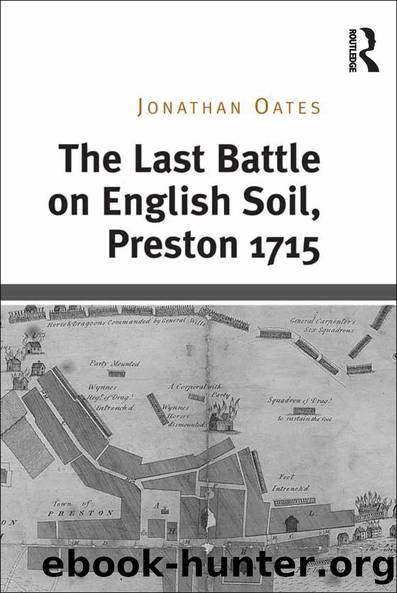The Last Battle on English Soil, Preston 1715 by Jonathan Oates

Author:Jonathan Oates [Oates, Jonathan]
Language: eng
Format: epub
Tags: History, Europe, Great Britain, Georgian Era (1714-1837), Military, Wars & Conflicts (Other)
ISBN: 9781915070319
Google: U6akzgEACAAJ
Publisher: Helion & Company
Published: 2022-04-15T16:13:26+00:00
The Whigs
George I has often been portrayed as an unappealing and uncharismatic figure, remote from the majority of the nation and unable to speak much English. Yet some of this image is the result of Jacobite propaganda. At any rate, he was an experienced soldier and diplomat and did not lack for supporters. Crucially, he was Protestant. There were the Dissenters who supported him on religious grounds. Secondly, and again on religious grounds, most Protestant Englishmen were anti-Catholic and a return of the Stuarts almost certainly meant the promotion of Catholicism, which had happened during James IIâs reign. George I was important for what he was not as well as for what he was. Then there were secular reasons. The Whigs had been handsomely rewarded with offices and places of profit, and they certainly wanted to maintain these against any Jacobite threat. Those who supported George wanted to maintain, and perhaps further, their position in the new status quo. They included noblemen, gentry and clergy.
Principal among the Whigs in the counties were the Lords Lieutenant. The third Earl of Carlisle was the eldest of these. He succeeded to the title in 1692 on his fatherâs death and was given the appointment of Governor of Carlisle Castle. In 1694, on the first Viscount of Lonsdaleâs death, he was made Lord Lieutenant of Cumberland and Westmorland. In the following decade, further honours followed â Deputy Earl Marshal of England in 1700, member of the Privy Council, 1701 and First Lord of the Treasury in the same year. Although he lost these posts in 1712, he was reinstated in 1714 and in 1715, as First Lord of the Treasury (until October) and then Constable of the Tower.43
Viscount Lonsdale was another key supporter of the Hanoverian state in the North West. Symson wrote of him thus: âThe worthy Lord Lonsdale, who is now in this county is warm in the defence of King George And this country against Popish tyranny and slavery and may truly be styled the northern Heroâ.44 Patten wrote likewise: âThe Lord Lonsdale whose Predecessors have been famous for their loyalty as well as Antiquity, had still considerable Interest in that County. This Nobleman, thoâ young, has still very valuable and endearing Accomplishments, and no small share of Courageâ.45
Lonsdale was Henry Lowther (1694â1751), and had become third Viscount on his brotherâs death in 1713. Their father had played his part in promoting Williamâs interests in the North West in 1688. Although he was only a deputy lieutenant in 1715, he was the most senior among their number, being the only peer therein.46
Another Lord Lieutenant was Hugh Cholmondeley (c. 1662â1725), first Earl of Cholmondeley. He had been a critic of James II and supported William III. Created Lord Lieutenant of Cheshire in 1704, though dismissed in the Tory purge in 1713, he was reinstated on George Iâs accession. He was also made an official of the Royal Household at this time.47
Then there was Edward Stanley (1664â1732), tenth Earl of Derby. Although his
Download
This site does not store any files on its server. We only index and link to content provided by other sites. Please contact the content providers to delete copyright contents if any and email us, we'll remove relevant links or contents immediately.
| General | Channel Islands |
| England | Northern Ireland |
| Scotland | Wales |
Room 212 by Kate Stewart(5090)
The Crown by Robert Lacey(4785)
Endurance: Shackleton's Incredible Voyage by Alfred Lansing(4743)
The Iron Duke by The Iron Duke(4334)
The Rape of Nanking by Iris Chang(4189)
Joan of Arc by Mary Gordon(4079)
Killing England by Bill O'Reilly(3986)
Say Nothing by Patrick Radden Keefe(3964)
I'll Give You the Sun by Jandy Nelson(3414)
Shadow of Night by Deborah Harkness(3340)
Hitler's Monsters by Eric Kurlander(3317)
Mary, Queen of Scots, and the Murder of Lord Darnley by Alison Weir(3188)
Blood and Sand by Alex Von Tunzelmann(3180)
Eleanor & Park by Rainbow Rowell(3139)
Darkest Hour by Anthony McCarten(3112)
Margaret Thatcher: The Autobiography by Thatcher Margaret(3065)
Book of Life by Deborah Harkness(2913)
Red Famine: Stalin's War on Ukraine by Anne Applebaum(2908)
The One Memory of Flora Banks by Emily Barr(2846)
